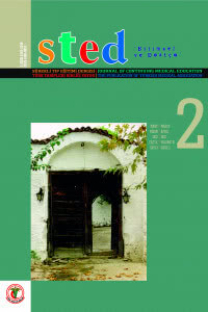Tarihsel/Toplumsal Travmalar ve Kuşaklararası Aktarımı Biçimleri Üzerine
A Study on Historical/Social Traumas and the Forms of Intergenerational Transmission
___
- 1. Toledo P. Transgenerational trauma: Autonomy, anger and Somatization Bbtween children of traumatized and non–traumatized parents, Unpublished Phd Thesis, Bahçeşehir University, 2014 İstanbul.
- 2. Danieli Y. International Handbook of Multigenerational Legacies of Trauma, 1998. Accessed May 1, 2020 at http://www.ptsd.va.gov/professional/newslette rs/research-quarterly/V8N1.pdf
- 3. Dekel R, Goldblatt H. Is there intergenerational transmission of trauma? The case of combat veterans’ children. Am J Orthopsychiatry. 2008;78:281-289.
- 4. Bombay A, Matheson K, Anisman H. Intergenerational trauma: Convergence of multiple processes among first nations peoples in Canada. Journal of Aboriginal Health, J Aborig Health. 2009;5(3):6–47.
- 5. O’Neill L, Fraser T, Kitchenham A, McDonald V. Hidden burdens: A review of intergenerational, historical and complex trauma, implications for indigenous families. Journal of Child & Adolescent Trauma. 2016;11(2):173–186.
- 6. Lee J, Kwak YS, Kim YJ, Kim EJ, Park EJ, Shin Y, et al. Transgenerational Transmission of Trauma: Psychiatric evaluation of offspring of former “Comfort Women,” Survivors of the Japanese Military Sexual Slavery during World War II. Psychiatry Investigation. 2019;16(3):249-253.
- 7. Dalgaard NT, Todd BK, Daniel SI, Montgomery E. The transmission of trauma in refugee families: Associations between intra-family trauma communication style, children’s attachment security and psychosocial adjustment. Attach Hum Dev. 2016;18:69-89.
- 8. Vaage AB, Thomsen P, Rousseau C, Wentzel- Larsen T, Thong T, Hauff E. Paternal predictors of the mental health of children of Vietnamese refugees. Child and Adolescent Psychiatry and Mental Health. 2011; 5(1): 2.
- 9. Shrira A. Parental PTSD, health behaviors and successful aging among offspring of Holocaust survivors. Psychiatry Research. 2019; 271: 265.
- 10. Forrest‐Perkins K. A critical look at intergenerational trauma and substance misuse: Implications for prevention. SAMHSA’s Center for the Application of Prevention Technologies; Webinar held on. Accessed March 18, 2020 at https://www.samhsa.gov/capt/sites/default/file s/resources/intergenerational-traumatranscript. pdf
- 11. Kellerman NP. Psychopathology in children of Holocaust survivors: A review of the research literature. Isr J Psychiatry Relat Sci. 2001;38:36.
- 12. Ramo‐Fernández L, Schneider A, Wilker S, Kolassa IT. Epigenetic alterations associated with war trauma and childhood maltreatment. Behavioral Sciences and the Law. 2015;33(5):701-721.
- 13. Chaumette B, Kebir O, Mam Lam Fook C, Bourgin J, Godsil BP3, Gaillard R, Jay TM, Krebs MO. Stress and psychotic transition: A literature review Encephale. 2016: 42(4):367-73 2016 Aug;42(4):367-73. doi: 10.1016/j.encep.2015.10.001.
- 14. Isobel S, Goodyear M, Furness T, Foster K. Preventing intergenerational trauma transmission: A critical interpretive synthesis. J Clin Nurs. 2019: 28(7-8);1100-1113.
- 15. Yehuda R,Lehrner A. Intergenerational transmission of trauma effects: Putative role of epigenetic mechanisms. World Psychiatry. 2018; 17(3): 243–257.
- 16. Salberg J. The texture of traumatic attachment: presence and ghostly absence in transgenerational transmission. Psychoanal Q. 2015;84(1):21–46.
- 17. Karatay G, Günderci A, Demir MC, Gürarslan Baş N, Çevik Y. The Psychotraumatic effects of ‘Dersim 38’ on the second and third generation. Academic Research International. 2017; 8(2): 78-88.
- 18. Ramo‐Fernández L, Schneider A, Wilker S, Kolassa IT. Epigenetic alterations associated with war trauma and childhood maltreatment. Behavioral Sciences and the Law. 2015;33(5):701-721.
- 19. Pervanidou P, Makris G, Chrousos G, Agorastos A. Early life stress and pediatric posttraumatic stress disorder. Brain Sci. 2020; 10:169-1-16.
- 20. Charmandari E, Tsigos C, Chrousos G. Endocrinology of the stress response. Annu. Rev. Physiol. 2005: 67; 259–284.
- 21. Karenian H, Livaditis M, Karenian S. Zafiriadis K, Bochtsou V, Xenitidis K. Collective trauma transmission and traumatic reactions among descendants of Armenian refugees. Int J Soc Psychiatry. 2011;57:327‐37.
- 22.Kuhlman KR, Geiss EG, Vargas I, Lopez-Duran N. HPA-Axis activation as a key moderator of childhood trauma exposure and adolescent mental health. J Abnorm Child Psychol. 2018;46(1):149-157.
- 23. Laub D. Traumatic shutdown of narrative and symbolization: A death instinct derivative? In Lost in Transmission, ed. G. Fromm. London: Karnac Books; 2012.
- 24. Yahyavi ST, Zarghami M, Naghshvar F et al. Relationship of cortisol, nor-epinephrine, and epinephrine levels with war-induced posttraumatic stressdisorder in fathers and their offspring. Rev Bras Psiquiatr. 2015;37:93-8.
- 25. McLaughlin KA, Sheridan MA, Lambert HK. Childhood adversity and neural development: deprivation and threat as distinct dimensions of early experience. Neuroscience and Biobehavioural Review. 2014; 47: 578-591.
- 26. McLean S. The effect of trauma on the brain development of children. Evidence-based principles for supporting the recovery of children in care. Accessed May 1, 2020 at https://aifs.gov.au/cfca/publications/effecttrauma- brain-development-children
- ISSN: 1300-0853
- Yayın Aralığı: 6
- Başlangıç: 1992
- Yayıncı: -
İsmet DEMİRTAŞ, Sevilay AYYILDIZ, Behçet AYYILDIZ, Koral Çağlar KUŞ
Gebelikte Bilgi İhtiyacının Karşılanmasında İnternetin Rolü
Ebru CİRBAN EKREM, Sevgi ÖZSOY
Tugba Yılmaz ESENCAN, Ayça DEMİR YILDIRIM
Adölesan Çağ Öğrencilerin Diyabet Bilgi ve Farkındalık Düzeylerinin Değerlendirilmesi
YELİZ MERCAN, Sünbül Hülya ARIKAN, Ebru DERELİ, Nüket PANCAR
Gebelerin Oral Gluikoz Tolerans Testi (OGTT) Yaptırma Durumlarına Medyanın Etkisi
Arzu ÇAKIR, Kıymet YEŞİLÇİÇEK ÇALIK
Fazla Kilo Riski Olan Çocuklarda Vitamin D Düzeylerinin Değerlendirilmesi
Beril ÖZDEMİR, Sıdıka Songül YALÇIN
Tarihsel/Toplumsal Travmalar ve Kuşaklararası Aktarımı Biçimleri Üzerine
